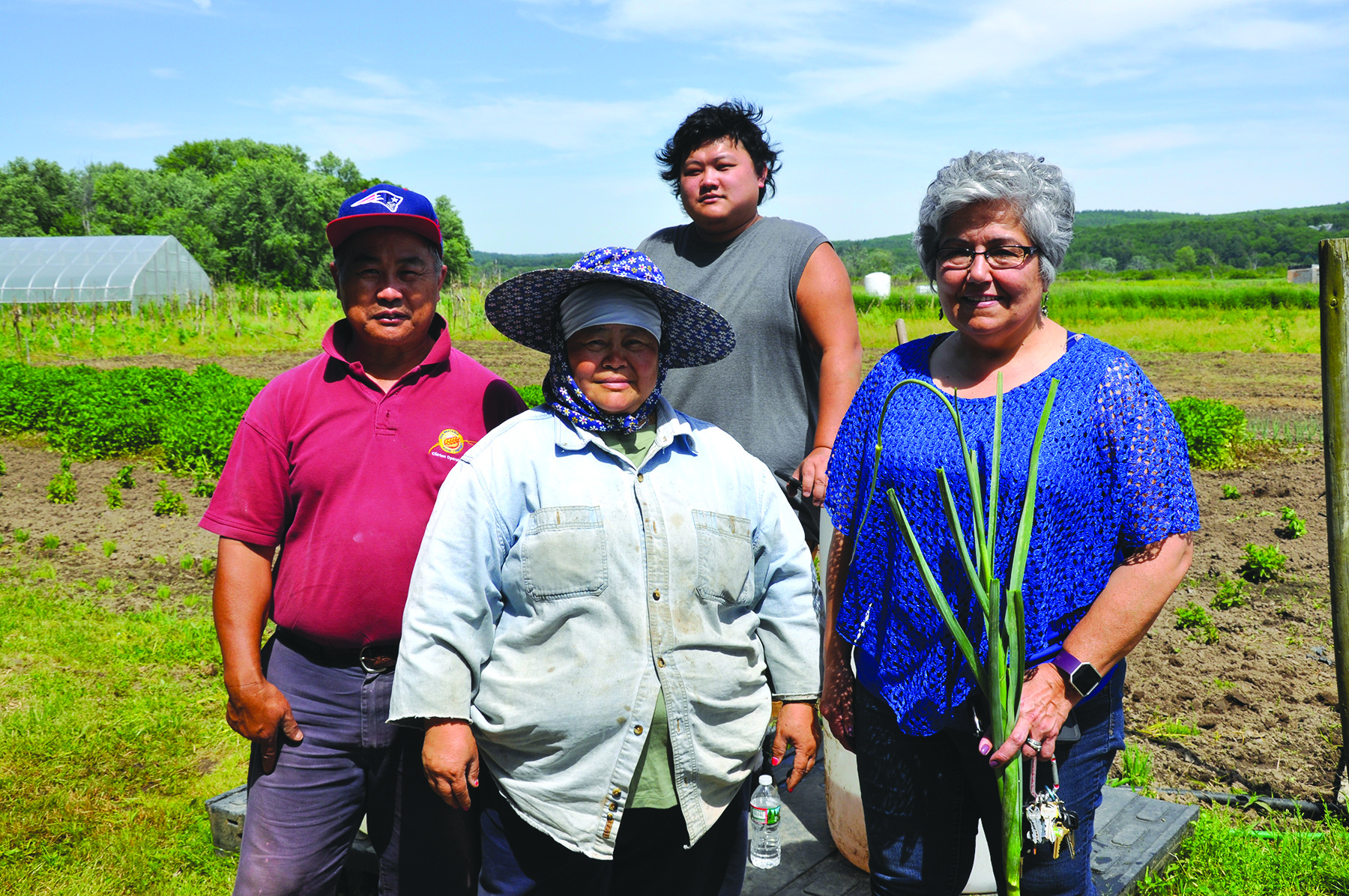Yia Ly Hang started farming at age 5 in her native Laos, Southeast Asia, but today works a plot of land at Flats Mentor Farm in Lancaster, Mass., and her freshly-grown produce is sold at several farmers’ markets, including the Ashland Farmers Market on Front St. which opened last month.
Our wet spring dashed her hopes of planting in early May, but June brought sunshine back to the Farm, the floods of the adjacent Nashua River subsided to a trickle, and Hang and other immigrant and refugee farmers could be seen tilling the soil by hand and getting to the honest, labor-intensive work of planting seedlings.
Her youngest child is 22 and often helps his mother at the Farm. Suny Hang is excited to bring their freshly-grown specialty crops to market this month. Under a tent touting the Flats Mentor Farm banner, the young man will sell his mother’s popular pea tendrils and snow peas, scallions, Asian greens, including bok choy, water spinach and Chinese spinach, parsley and cilantro.
Her story is an inspiring one. Yia Ly Hang’s family fled their homeland in the aftermath of the Vietnam War in the mid-70s and was offered sanctuary in the United States. Although Hang did not know English upon her arrival in the U.S., she successfully searched for work and held various factory jobs in plastics, first in Pennsylvania, then Rhode Island and Michigan. As a people, the Hmong are quick learners and at the time of the war, they only needed a short time to become accustomed with work tasks in the United States.
After learning about the Flats Mentor Farm through relatives in Massachusetts, Hang started growing vegetables ten years ago to economically feed her family and make extra money on the side. Eventually, she was exposed to wholesale and finally farmers markets. Now owning various plots and a high tunnel at the Flats, Hang keeps herself busy growing for her family and filling the demand of wholesale and farmers markets in Ashland, Framingham, and Harvard.
A National Model for the Beginning Farmer
Flats Mentor Farm is 70 acres of privately-owned fields, part of the Bolton Flats Wildlife Management area, owned by the Moreira family. Each year more than 250 immigrant and refugee farmers from diverse communities representing Southeast Asia and Africa are given the opportunity to learn sustainable growing techniques and receive support and guidance in bringing their crops to market.
Maria Moreira, a native of the Azores, came to the United States at age of 12 with her parents. Later she fell in love with Manny, a dairy farmer, settled in Central Mass., and went about raising a family of four and starting her own small business making a soft Portuguese fresh cheese.
One day a Hmong woman, an immigrant from Laos, approached Moreira about using the small space between the cow barns to grow crops. Moreira said yes. Word spread and little by little more Hmong came and asked if they could farm the nearby acreage where the Moreira family grew sileage corn to feed their cows.
Moreira saw the Hmong as hard-working and committed farmers whose needs were compelling. Passionate about helping others, she and her husband opened the family’s 70 acres to immigrant and refugee farmers, each in charge of his or her own plot, and in 1984 Flats Mentor Farm sprouted roots.
In 1999, the United States Department of Agriculture (USDA) looked at this program as a national model for what a beginning farmer training program should look like.
“I totally identify with these farmers,” Moreira said, “because I was new to this country once and could not speak the language. But I am a farmer at heart and knew I could be successful. I love what happens here. We help people move forward to become independent farmers and landowners.”
She didn’t realize it at the time, but now that her own children are grown and have families of their own, they share that their upbringing on the farm helped give them a strong work ethic. “Hard work was the norm for my children,” Moreira added.
In 2010, Moreira and two colleagues, Ali Berlow and Frank Mangan, created the World Farmers Organization, a nonprofit entity that represents farmers’ needs in this country as well as internationally. Moreira serves as the executive director, working with a staff of three. For the past five years, World Farmers has completed extensive evaluation and community surveying to identify ethnic crops that are in high demand by immigrant communities, yet unavailable at grocery stores and farmers’ markets.
“I am entrepreneurial by nature,” Moreira said. “Crops selected for production trials and market assessments are exclusively grown by farmers at Flats Mentor Farm for diverse markets serving communities with limited access to fresh, culturally-relevant food. Our organization helps ensure farmers are getting equal access to markets and receiving fair prices for their labors.”
In 2016, Flats Mentor Farm produce was sold at over 40 farmers’ markets across the state.
Discover more about Flats Mentor Farm and the World Farmers Organization at worldfarmers.org.

